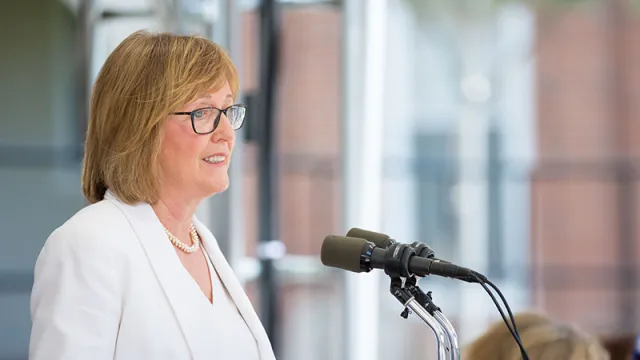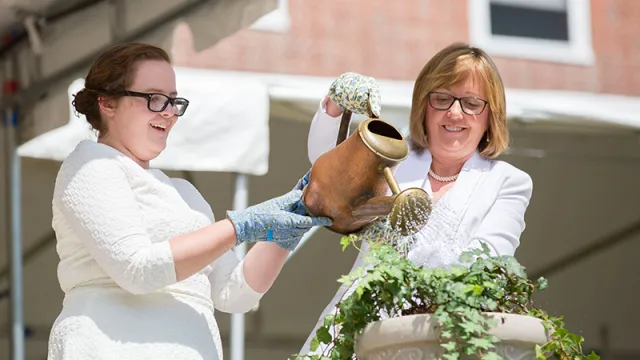Remarks at Ivy Day 2016
President Kathleen McCartney, Ivy Day, May 14, 2016; All Reunion Weekend, May 21, 2016

Good morning and welcome! Happy Ivy Day!
I am delighted to be here this morning with all of you. With the great class of 2016. With parents and friends. And with the hundreds of alumnae celebrating milestone reunions.
The classes of 1966, 1976, 1986, 1996 and 2006!
Such a moving sight: all of you marching together as one.
Take a moment.
Look around at this remarkable gathering.
Draw strength from it.
You are a part of something greater than yourselves alone.
In coming together today, we have a great deal to celebrate: 16 Fulbright fellows. Beautiful new student apartments, named for pioneering Smith alumnae. Plans for a new Neilson Library, being designed by Maya Lin. Record application numbers for the class of 2020. And remarkable momentum in our Women for the World campaign.
This success is for and about each one of you: Alumnae who sustain Smith and hold this place so close in your hearts. Families and friends who support our students. And seniors—the great class of 2016—who worked so hard to get to this milestone day.
Seniors, you know best that you are embarking on a big change as you transition from what some of you call the Smith bubble to a new life. With a new job, internship or course of study in graduate school. With a new address, in a new city. With new friends and colleagues. And with new rhythms to your days.
As you prepare to leave Smith, I want to share a few thoughts about change.
The first reflects my discipline, which is psychology. There is no learning without change. And in every theory of human development, learning is driven by frustration, failure, uncertainty and loss.
Babies and toddlers approach change easily. Early childhood educators often describe young children as eager to learn.
As we age, change becomes harder and harder because we are comfortable with the patterns that work for us.
When I came to Smith three years ago, so many people asked me, “Are you nervous?” Interestingly, no one asked me, “Are you excited?” I was both, of course.
I left so much behind—a home, a job, and friends.
My transition to Smith was hard, but not as hard as other moves I have made in my life because I have lived through other changes, and I drew strength from my past. I kept reminding myself that my anxiety would lessen, day by day.
Also, and this is the important part, I kept telling myself that I would change in ways I could not yet imagine. And so I have.
Over the course of my life, I have experienced the learning that comes from frustration, failure, uncertainty and loss.
So have you. Just think about your first few days and weeks on the Smith campus.
Many of you left home for the first time.
Many of you struggled a bit with how to participate in class discussions, how to take notes, and how to write a paper for college.
Many of you explored new activities and clubs.
And it all worked out. Your presence here today is evidence of this.
You can take the hard-fought lessons from your first days on the Smith campus and use them as you prepare to leave.
Perhaps these lessons will help you to embrace change, not fear it.
When I was in graduate school, I saw the comedian, Steve Martin, perform live. There is one bit I will never forget, not so much because it was funny but because I was puzzled by it.
He said, “You know what’s great about getting old? You don’t have to have an open mind about trying anything new. When one of your friends says, hey, let’s try this new thing, you can just say NO!” And then he made the sound of a door closing.
Now that I am older, I get the joke. The older we are, the more resistant we are to change.
This past spring, one of my colleagues, in Buddhist Studies, suggested I read the Tao Te Ching, the classic Chinese text fundamental to Taoism.
One of the teachings is this: “When I let go of what I am, I become what I might be.”
In order to grow as a person, we have to shed the old to prepare for the new. I think it takes courage to change. But you are Smithies, so I am betting on you. I’m betting you will be change addicts. I could wish you no better path.
I think the parents here today will resonate with what I am about to say about a time when I dreaded the change I knew would come.
I enjoyed raising my two daughters so very much. The big transitions in my daughters’ lives were big transitions for me as well. I can remember waiting at the school bus when my younger daughter, Kimberly, was about to board it on the first day of kindergarten.
And I remember the day, 13 years later, when I helped her unpack her room for the first time at Wesleyan University.
Both of these moments, and many others like them, represented a kind of loss for me. When Kimberly left for college, motherhood, as I knew it, was over. Yet, I didn’t want Kimberly to remain a preschooler or an adolescent forever—especially not an adolescent.
Kimberly is 30 years old, but I am still her mother, even as she has taken on new roles: wife, civil rights lawyer, amazing baker, and as of last Christmas day—mother.
Watching Kimberly as a new mother has brought me indescribable joy. And being a grandmother has been a welcomed change in my life.
My relationship with Kimberly deepens with every passing day, of course. So why did the passing of her childhood feel so fearful?
The answer to that question didn’t lie in my psychology books. I found it in William Shakespeare’s 73rd sonnet, which is about the fear of change. The brilliance of this sonnet is contained in the final couplet, where Shakespeare turns fear to appreciation:
This thou perceivest, which makes thy love more strong,
To love that well which thou must leave ere long.
Because we must leave—places, people and life itself—we love fiercely. That may be one of life’s greatest lessons.
Graduates, if it feels hard to leave Smith to become what you might be, think about what a gift that is.
Alumnae, you know this well. Smith is always present in your life, if you want it to be.
That should be clear from the alumnae parade today. Life-long friends reunited.
Alumnae, I love the stories of Smith in your life.
When you call your roommate, it’s like no time has passed
When you meet someone, immediately like her, and discover she, too, is a Smithie.
When you celebrate Mountain Day with your Smith Club wherever you are in the world. Yes, graduates, you will get an email when I call Mountain Day next fall.
When you recite a poem you analyzed in English class and think fondly of the professor who said that poetry is a gateway to the human experience.
When you return for reunion, as so many have this weekend, to be with one another and to welcome the next alumnae class, the class of 2016. You are a part of something greater than yourselves alone.
I can promise you that the importance of Smith in your lives is one thing that will never change.
Thank you.
There is an alumna here today who believes in the importance of Smith with all her soul. I want to acknowledge a wonderful Smith alumna and friend.
Elizabeth Mugar Eveillard, class of 1969, has been a member of the Smith College Board of Trustees since 2003 and the chair of the board since 2012.
As Betty steps down from that role, she leaves a remarkable legacy of leadership.
Betty has led with extraordinary dedication.
She has mentored students, particularly international students.
She has played an instrumental role in our Women for the World campaign.
In leading our board, she has modeled inclusive, consultative governance.
Betty, for everything you have brought to Smith College...
For the strong and sustainable future your leadership has inspired...
For helping us “become what we might be...”
We offer our deepest gratitude.
